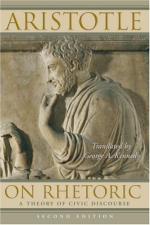
|
| Name: _________________________ | Period: ___________________ |
This quiz consists of 5 multiple choice and 5 short answer questions through Book III, Chapters 13-19.
Multiple Choice Questions
1. How did Aristotle think a political orator should convince an audience of their plan?
(a) By showing that it was better than all other options.
(b) By showing that it was better than most other options.
(c) By showing that it was just as good as all other options.
(d) By showing that it was just as good as most other options.
2. Which type of disgraces made shame especially significant in Aristotle's opinion?
(a) Financial.
(b) Moral.
(c) Individual.
(d) Collective.
3. What type of resources available to the government did Aristotle mention in Book I, Chapter 4?
(a) Financial and legal.
(b) Financial.
(c) Everything except financial and legal.
(d) Everything except financial.
4. Which of the following was a reason that Aristotle included as a cause of pity?
(a) Undeserved punishment.
(b) Laziness.
(c) Deserved punishment.
(d) Luck.
5. Which of the following examples best demonstrates Aristotle's theory of possibility in Book II, Chapter 19?
(a) Thunder and lightening.
(b) Heat and sunshine.
(c) Clouds and rain.
(d) Snow and ice.
Short Answer Questions
1. In what way did Aristotle think the enthymeme should be used in legal oratory?
2. As explained in Book I, Chapter 3, which type of rhetoric attempted to convince a legislature to take a particular action?
3. Concerning the elicitation of the praise or blame of an audience, what was epideictic rhetoric also called by Aristotle?
4. As explained by Aristotle in Book II, Chapter 24, what else might a person equivocate?
5. Based on Aristotle's explanation, what was the difference between envy and emulation?
|
This section contains 322 words (approx. 2 pages at 300 words per page) |

|




